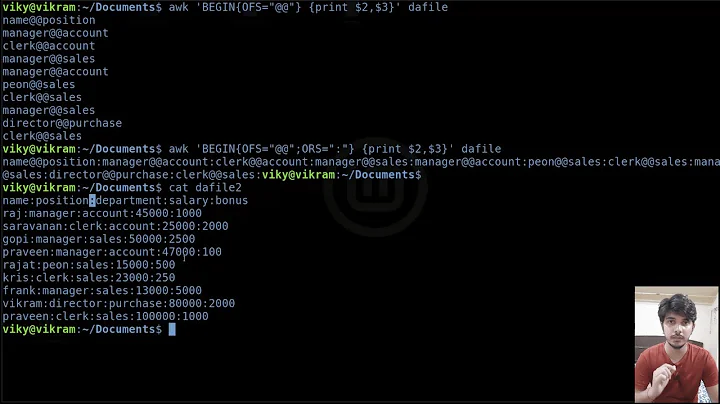Use awk results as parameters to another command
12,783
Solution 1
You can also use xargs (-l makes it run a separate command for each line):
timp@helez:~/tmp$ awk -F"\t" '$3 == "76" { print $1"\t"$2}' test.txt | xargs -l ./build.oct
$1 is 1000 and $2 is 2
$1 is 1001 and $2 is 1
timp@helez:~/tmp$ cat test.txt
1000 1 75
1000 2 76
1001 1 76
1001 2 80
timp@helez:~/tmp$ cat build.oct
echo '$1 is ' $1 ' and $2 is ' $2
As suggested in the comments you can also simplify the awk command, since both awk and xargs split on both tabs and spaces:
timp@helez:~/tmp$ awk '$3 == "76" {print $1,$2}' test.txt | xargs -l ./build.oct
$1 is 1000 and $2 is 2
$1 is 1001 and $2 is 1
Solution 2
This worked for me:
awk -F"\t" '$3 == "76" { printf "./build.oct %d %d\n", $1, $2}' \
../benchmark/*/labels.txt | bash
Related videos on Youtube
Author by
Gilles 'SO- stop being evil'
Updated on September 18, 2022Comments
-
 Gilles 'SO- stop being evil' over 1 year
Gilles 'SO- stop being evil' over 1 yearI'm extracting rows from a set of text files with awk. The files look like this:
1000 1 75 1000 2 76 1001 1 76 1001 2 80I'm searching several directories of these with this command:
awk -F"\t" '$3 == "76" { print $1"\t"$2}' ../benchmark/*/labels.txtawk is giving me the correct output:
1000 2 1001 1Now for each found row I must execute a script passing these two numbers as parameters, like this:
./build.oct 1000 2What's the correct way to do that? I don't really care about script console output (it produces files).
-
 Stéphane Chazelas almost 10 yearsBecause the awk output is interpreted as shell code, you may want to sanitise your input. Replacing the %s with %d would make it safer in the event someone has managed to sneak a
Stéphane Chazelas almost 10 yearsBecause the awk output is interpreted as shell code, you may want to sanitise your input. Replacing the %s with %d would make it safer in the event someone has managed to sneak a;rm -rf /in the input files. -
 Stéphane Chazelas almost 10 yearsYou can simplify it to
Stéphane Chazelas almost 10 yearsYou can simplify it toprint $1,$2since xargs will split on space as well as on tab characters. -
 chaos almost 10 years@StéphaneChazelas Good point, I edited my answer, thanks
chaos almost 10 years@StéphaneChazelas Good point, I edited my answer, thanks -
TimP almost 10 years@stéphane-chazelas, correct; I was following the example of the original asker, but it can be simplified. I'll add a note to my answer about the shorter version of the
awkcommand. -
 Admin almost 2 years(1) What does “if you have multiple outputs across the command line or the file” mean? How does it relate to this question? (2) Please don't add "thank you" as an answer. Once you have sufficient reputation, you will be able to vote up questions and answers that you found helpful. (3) Copying somebody else’s answer and then inflating it with particulars from your situation, which are unique to you, isn’t really helpful — especially when you don’t show what data you are working with. … (Cont’d)
Admin almost 2 years(1) What does “if you have multiple outputs across the command line or the file” mean? How does it relate to this question? (2) Please don't add "thank you" as an answer. Once you have sufficient reputation, you will be able to vote up questions and answers that you found helpful. (3) Copying somebody else’s answer and then inflating it with particulars from your situation, which are unique to you, isn’t really helpful — especially when you don’t show what data you are working with. … (Cont’d) -
 Admin almost 2 years(Cont’d) … (4) And, if you are going to copy somebody else’s answer, you should say clearly that you are doing so, linking to the source and stating the name of the original author. (5) Awk is a very powerful program; you almost never need to combine it with grep or sed. In particular,
Admin almost 2 years(Cont’d) … (4) And, if you are going to copy somebody else’s answer, you should say clearly that you are doing so, linking to the source and stating the name of the original author. (5) Awk is a very powerful program; you almost never need to combine it with grep or sed. In particular,grep wireguard | awk '{command…}'can be simplified toawk '/wireguard/ {command…}'. (6) Why do you sayprintf "%s\n", $2instead ofprint $2? … (Cont’d) -
 Admin almost 2 years(Cont’d) … (7) Please learn how and when to use quotes in shell command lines. (See Why does my shell script choke on whitespace or other special characters?) (8) See Why is using a shell loop to process text considered bad practice? - From Review
Admin almost 2 years(Cont’d) … (7) Please learn how and when to use quotes in shell command lines. (See Why does my shell script choke on whitespace or other special characters?) (8) See Why is using a shell loop to process text considered bad practice? - From Review -
 Admin almost 2 yearsFor any significant volume of data awk parsing is usually more efficient than shell, especially here where shell needs an added
Admin almost 2 yearsFor any significant volume of data awk parsing is usually more efficient than shell, especially here where shell needs an addedcat.IFS='\t'doesn't work in bash; you needIFS=$'\t'or quotes with an actual tab char (usually input with control-V,control-I but may vary). OP didn't express any need to remove dupes but if needed awk can do it without sorting by&&!seen[$1,$2]++. -
 Admin almost 2 yearsI was wondering which was more efficient for massive input and my intuition is matching your advice.
Admin almost 2 yearsI was wondering which was more efficient for massive input and my intuition is matching your advice. -
 Admin almost 2 years(1) simplified/edited as "multiple outputs" (2) (3) (4) (5) I don't know what you're talking about but I clearly mentioned that it was my command line. and using some variants won't hurt the system. (6) I wanted to separate my outputs with new line for another purpose, thus the use of '\n'. (7) Again, I don't know what you're trying to explain but thanks for the advice.
Admin almost 2 years(1) simplified/edited as "multiple outputs" (2) (3) (4) (5) I don't know what you're talking about but I clearly mentioned that it was my command line. and using some variants won't hurt the system. (6) I wanted to separate my outputs with new line for another purpose, thus the use of '\n'. (7) Again, I don't know what you're trying to explain but thanks for the advice. -
 Admin almost 2 years(1) As Stéphane Chazelas hinted in his comment, this can be dangerous if an attacker can write to your input file and say, for example, “
Admin almost 2 years(1) As Stéphane Chazelas hinted in his comment, this can be dangerous if an attacker can write to your input file and say, for example, “;shutdown now 76” or “;rm * 76”. (2) This almost certainly runs a new bash process for each line of input. (I don’t see any other answer that does that.) -
 Admin almost 2 yearsThank you for responding politely. (1) Well, I still don’t understand what you mean by “Using
Admin almost 2 yearsThank you for responding politely. (1) Well, I still don’t understand what you mean by “Usingwhileis the best answer if you have multiple outputs”. … (Cont’d) -
 Admin almost 2 years(Cont’d) … (2), (3) & (4) Your first answer is essentially equivalent to pepoluan’s answer but adapted to your problem. Your second answer is identical to their answer except for spacing. (2) Posting somebody else’s answer as a new answer looks like you’re saying “Hey! This answer works! Thanks!” (4) Copying other people’s work without giving credit to the original author is forbidden here. … (Cont’d)
Admin almost 2 years(Cont’d) … (2), (3) & (4) Your first answer is essentially equivalent to pepoluan’s answer but adapted to your problem. Your second answer is identical to their answer except for spacing. (2) Posting somebody else’s answer as a new answer looks like you’re saying “Hey! This answer works! Thanks!” (4) Copying other people’s work without giving credit to the original author is forbidden here. … (Cont’d) -
 Admin almost 2 years(Cont’d) … (5) What do you not understand? Look at the difference between your first answer (
Admin almost 2 years(Cont’d) … (5) What do you not understand? Look at the difference between your first answer (grep wireguard | awk '{…}') and your second answer (awk '$3 == "76" {…}'). (6) My point was that, whileprintfprints only the characters you give it,printautomatically prints them on a separate line. Not only is it shorter, but there is a technical reason whyprint xis preferable toprintf "%s\n" x. (7) See my edit to your answer. -
 Admin almost 2 years@G-ManSays'ReinstateMonica', Thank you! (1) true. That is why I wrote "along the lines of". I never know how to deal with it: The correct solution is tends to hide the basic idea.. (2) true. It can be a problem if you have millions of lines but in many cases this is what we really need, and what is going to be the reasonable solution.
Admin almost 2 years@G-ManSays'ReinstateMonica', Thank you! (1) true. That is why I wrote "along the lines of". I never know how to deal with it: The correct solution is tends to hide the basic idea.. (2) true. It can be a problem if you have millions of lines but in many cases this is what we really need, and what is going to be the reasonable solution.




